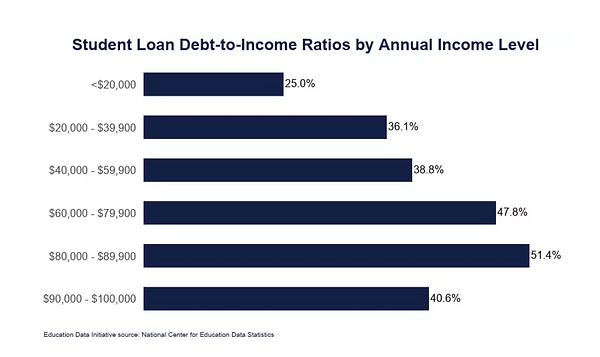
ABOUT PROSP
Prosp is an organization to bridge the disparity between free educational and professional resources with the lower, working, and middle classes.
The problem or social issue Prosp addresses is the low affordability of education in the United for the lower, working, and middle classes. The extent of this issue is quite severe – this problem affects not only lower and working-class families but also the middle class. Educational debt is the fastest-growing category in the U.S. today (Experian). Students and families have to take on student loans to be able to afford college- Households in the lowest income quartile owe an estimated 12% of all student loan debt, while those with income higher than the national average owe an estimated 65% of the nation’s outstanding student loan debt (Education Data). Student debt is not proportional to income, see the figure below.

This problem exists as a result of the rising cost of education in the United States. According to the NY Times, the average cost of education has risen faster than inflation. (NY Times). College tuition has increased by 747.8% since 1963 (Education Data). On the other hand, funding from states for higher education has steadily declined. (NY Times). While this issue is already being addressed by the government and private institutes, with student loan relief and scholarships, there are still lots of scholarship money unclaimed every year. Biden announced student loan relief (White House). The problem here is that people still have student loans despite this relief and that students in the future will still have student loans. Over 1.7 million scholarships are awarded annually (Education Data). However, according to Forbes, an estimated $100M in scholarships are awarded each year, mostly due to a lack of applicants (Forbes). In other words, there are things being done by the government and by private and other institutions; however, there is still a disparity between the people and their access these resources.
Moreover, Prosp works to foster relationships by creating a support system for students to navigate opportunities. Cheryl Kiser stated that it is important to have a design that focuses on building relationships in order to foster a human-centered and sustainable system. Prosp strives to utilize technology to promote a relationship-based organization, as opposed to a process-based one.